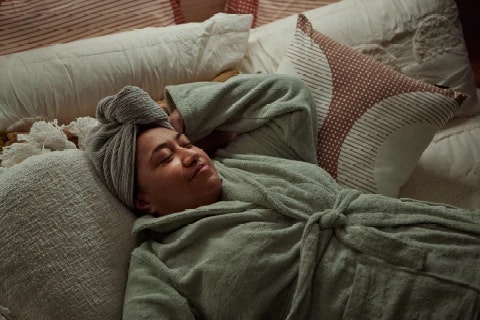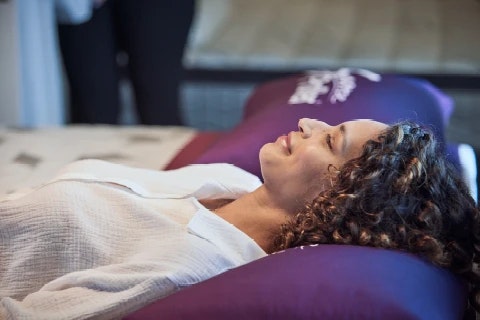4 ways to improve your sleep

Up to 40% of Australians are getting insufficient sleep according to the Age on the back ofPWC’s Health Research Institute report: The urgency of addressing social determinants of health. In this day and age, we seem to be working more, leading busier lives and experiencing higher levels of stress as a result, so is it any surprise that Australian’s have cited a lack of sleep as a leading barrier to experiencing a healthier lifestyle. Good sleep hygiene can help improve the likelihood of unwinding when in bed and experiencing a more restful sleep. Read on for some of our tips on how you can improve your chances of experiencing a good night’s sleep.

1. Set a sleep schedule
According to the National Sleep Health Foundation, we as adults should be experiencing between 7-9 hours sleep per night. It is also best to have a consistent sleep routine. Going to bed at the same time each night and waking up at the same time each morning ensure you fall into a natural circadian rhythm or a regular sleep/wake cycle. When implemented correctly, you will experience sleepiness around the same time each night. Try to stick to this schedule as closely as possible (even on weekends) and do not ignore the drowsiness, as this is when you’re bound to have the perfect window of opportunity for sleep and will ensure you don’t wake up feeling more lethargic than the night before. Try to start winding down an hour before you wish to sleep with a bedtime routine as it’ll help you fall asleep more quickly at night, with little to no interruptions. Stress increases the production of cortisol, making it harder to fall and stay asleep. If your worries keep you up at night, it’s a good idea to jot down your concerns for the next day in a notebook and make an active effort not to think about it until the following morning.

2. Light, noise and temperature
Have you ever wondered why darkness is best for sleep? The Sleep Council believes that when we are exposed to light, our bodies think it’s time to wake up. When it’s dark we release melatonin, which relaxes the body and helps us to doze off. There’s also nothing worse than being awoken by the early morning sun so try block out blinds or an eye mask. Your bedroom is your sanctuary - a calm, relaxed space but many are treating it as an extension to their living room and study. As tempting as it may be to bring electronics into the bedroom, try cease the use of these devices at least one hour before sleep. According to the National Sleep Health Foundation using any devices can wreak havoc with the body’s circadian rhythm, suppress melatonin and make it harder to drift off to sleep.
Noise is also another barrier for quality sleep. Loud, sudden or repetitive noises interrupt sleep and one of the best ways to solve this issue is to have double glazed windows or use foam ear plugs. If you have a mobile phone in the bedroom we suggest it’s switched to silent or the ‘do not disturb’ setting. Soft, steady sounds like ‘white noise’ can be soothing and help you fall asleep quicker and more soundly.
Room temperature is another factor to consider before getting some shut eye with the ideal room temperature according to The Sleep Council at 18 degrees. A naturally lower core temperature (like darkness) is one of the signals your body uses to start melatonin production and drift off to the land of nod.

3. Relax and de-stress
The final step in creating a perfect sleeping environment is to make it relaxing. The bedroom should be an oasis of calm and tranquility. A relaxation routine plays importantly into this. There are many ways you can relax before bed, you could try running a warm bath an hour before bedtime or use a diffuser with naturally calming scents such as lavender and geranium. Some people also find that soft, soothing music and practising mindfulness put them in the right frame of mind for sleeping. You could also incorporate a few breathing exercises or gentle stretches in your ritual to relieve tension from the day and help you experience relaxation. The Sleep Health Foundation have some great techniques you could try including guided meditation and three-part breathing which are very helpful in helping you clear the mind of the day’s clutter, relax and destress just in time for bed.

4. Right support & comfort
Your bed should be comfortable and supportive to help you sleep. It can be near impossible to get a quality night’s sleep on an old, worn and uncomfortable bed. An uncomfortable mattress lacking appropriate support & comfort is likely to leave you waking tired and sore. Everyone is different, which is why different mattresses suit different body types and individual circumstances. When looking for a new mattress, you should look for one which offers the ideal level of support and comfort for your weight and body shape, and if you have a sleeping partner, either customise each side with a SleepTailor® mattress or find one which is mutually supportive and comfortable. If this process sounds daunting to you, our Snooze Profiler® can help you find a mattress that’s a better fit for you by answering a few simple questions. Another important thing to note, is that a new mattress has a 7-10 year life expectancy and the correct supportive base will improve the performance of your mattress. Having a comfortable pillow is just as important and should be fitted to suit your mattress and how you sleep. Are you a warm or cool sleeper? If you know that you tend to sleep warm, it may be better to opt for light, breathable bedding.
Try getting up, if you’re not asleep within 20 to 30 minutes of going to bed, get up and go to another darkened room and sit quietly, but stay off those devices! When you start to feel tired and sleepy again, go back to bed as this helps your mind link the bed with sleep. If you’d like to discuss your bed, mattress, pillow or bedding needs, visit your local Snooze store. After all, it’s amazing what a little Snooze can do!
References:
- https://www.sleephealthfoundation.org.au/good-sleep-habits.html
- https://sleepcouncil.org.uk/perfect-sleep-environment/
- https://www.snooze.com.au/blogs/inspiration/how-to-create-a-bedtime-routine
- https://www.theage.com.au/national/victoria/australians-cite-lack-of-sleep-as-leading-barrier-to-healthy-lifestyle-20190929-p52vwv.html
- http://healthysleep.med.harvard.edu/healthy/getting/overcoming/tips
- https://www.pwc.com/sdoh
- https://www.sleephealthfoundation.org.au/how-much-sleep-do-you-really-need.html
- https://www.sleepfoundation.org/articles/relaxation-exercises-falling-asleep